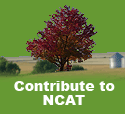|
|
 |
800-411-3222 (Español)
Principles of Sustainable Weed Management for Croplands (Summary)To some extent, weeds are a result of crop production, but to a larger extent they are a consequence of management decisions. Managing croplands according to nature's principles will reduce weed problems. And while these principles apply to most crops, this publication focuses on agronomic crops such as corn, soybeans, milo, and small grains. The opportunities to address the root causes of weeds are not always readily apparent, and often require some imagination to recognize. Creativity is key to taking advantage of these opportunities and devising sustainable cropping systems that prevent weed problems, rather than using quick-fix approaches. Annual monoculture crop production generally involves tillage that creates conditions hospitable to many weeds. This publication discusses several alternatives to conventional tillage systems, including allelopathy, intercropping, crop rotations, and a weed-free cropping design. A Resources list provides sources of further information. [HTML] [PDF / 189 kb] Download Acrobat Reader.
Last Updated December 28, 2007 |
|
Site Map | Comments | Disclaimer | Privacy Policy | Webmaster Copyright © NCAT 1997-2009. All Rights Reserved. |


